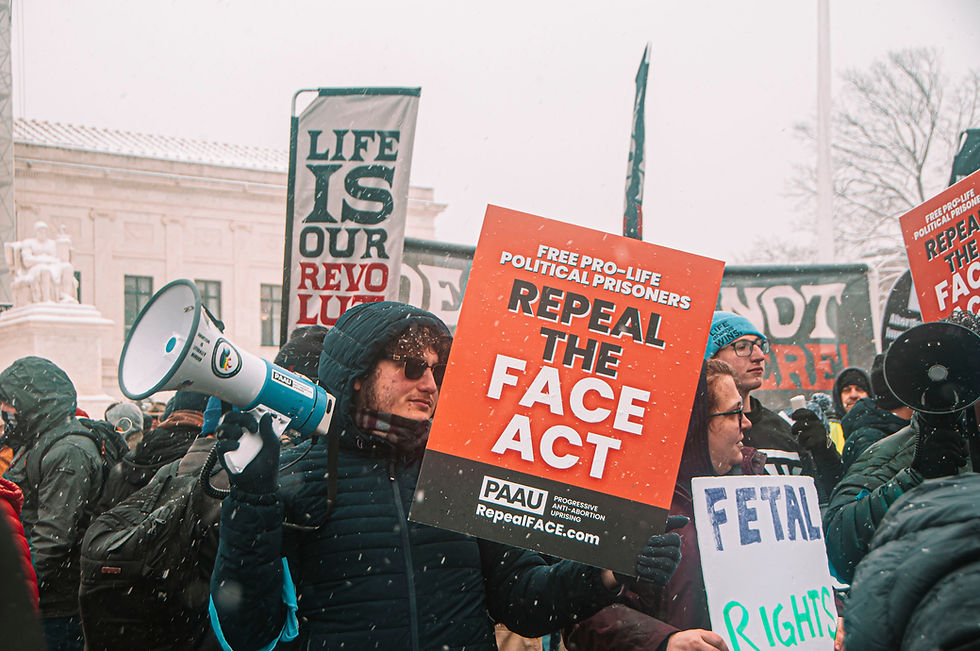An Outreach Conversation at Planned Parenthood
- lifemattersjournal

- Apr 5, 2018
- 3 min read
You don’t get to the truth through logic, most of the time. You get to the truth through relationship; and relationship through dialogue. Dehumanization is like a wound. The process of gradually removing, through language, another human being’s humanity in the perception of his or her fellows can only be addressed by deliberate re-humanization. To rehumanize is to reverse that damage done by dehumanization. This involves rehabilitating one's way of perceiving the other(s) in question, both in one's mind and in consequent behavior.
All of this is to say: When you break someone’s face, you have to touch it and bathe it to heal it.
When we break the relationships we have with reality and with each other by dehumanizing acts and language, we must come back into relationship to heal them through words and language. Thus, dialogue and encounter.
Which leads me to Carter.
She gave me a look. “I know a boy who’s a CJ.”
“Well I know a boy whose name is Carter. So we’re even.”
“No suh,” she said.
“Yeah suh.”
“Ok. And what’s your real name?”
“What’s yours?” I asked, and that miffed her.
At this point, you may want to know I’m speaking to a 5-year-old near Boston University. Her mother is a student. Up Commonwealth Avenue, Planned Parenthood is a landmark. Down Comm Ave, pubs, pizza, and Goodwill trail into the university campus; and students and professionals pass at different speeds, fairly indifferent to our encounter.
I’ve been out since noon asking potential Planned Parenthood clients, Can I offer you some information? or asking indifferent, irked, and curious passersby, Do you have a minute to answer a question?
The girl’s mom had had time to answer a question; but now she’s on her cell phone. Carter had time -- like most kids -- not to answer, but to ask a ream of questions. First was: What’s your name?
She crossed her arms at me. Her mom smiled a thanks-sorry at me, listening hard to her phone.
“Mommy’s not right,” said Carter, “And you’re not either.”
The logic confused me for a minute -- since her mom’s answer to my question, When should we protect people from violence? was We can’t and It's not a human (referring to fetal humans). And mine was, you can and embryology textbooks seem to show otherwise.
“How?”
“Your name.” She stomped.
“I can choose my name,” I said reasonably. “But it's not my right to choose when someone deserves to be cared about and protected.” This was less for her benefit than for the crossed-arm undergrad who had stopped to listen.
“No suh,” she said, “Not if it’s not true.”
Then her mom hung up, apologized profusely, refused longer dialogue, and tugged her baby away from me, from Planned Parenthood, down the grey pavement into a grey day.
“Are you one of those nuts?” said the undergrad.
“What kind?” I asked him.
“You think abortion is, like, horrible and sex too.”
“I think killing is horrible, and like, sex, amazing.”
We went on to talk about pro-life feminism, Planned Parenthood’s lack of resources aside from abortion, and how I, as a woman, didn’t think my equality should hinge on a decision to commit violence against a small human being.
“Can we choose whatever, for ourselves, or others? Is a choice in itself, per se, good?”
“I’m pro-choice,” he said.
“Me too. But are all choices equal, like people?”
“No. But you’re wrong -- stop telling...other girls what to do.” And he walked away. He hadn’t asked questions, like Carter.
But it struck me as he turned -- and I caught a duo of heavy-coated young women, tucking an information card into their hands -- that Carter’s answer to my name summed it up: Not if it’s not true, you can’t.
Maybe I can choose my name (maybe Carter has more grounds for why not). But if what PP claims -- that a baby in-utero isn’t really human or worth protecting -- isn’t true…
...then abortion? You can’t.
For more information on Rehumanize International's Sidewalk Sidekicks materials visit this link, or for the outreach tour Bad Words, on dehumanizing language, please visit here.







Comments